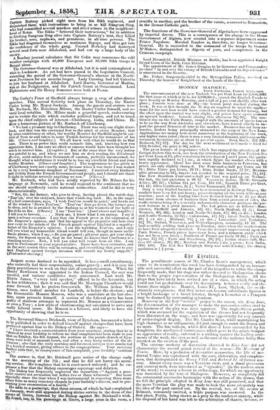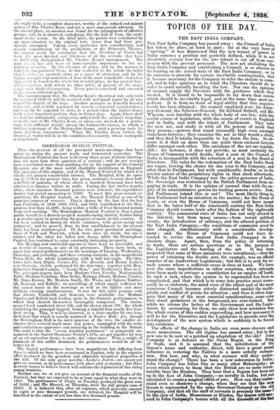toattc5.
The penultimate season of Mr. Charles Kean's management, which came to its termination this week has been distinguished by an honour- able and successful effort on the part of the tragedian to refute the charge frequently made, that his stage was rather devoted to Shaltsperian shows than to the proper representation of the Shaksperian drama. All the plays that have lately been revived are of a class, in which the acting could not but predominate over the decorations, however costly end ela- borate these might be. Hamlet, Louis XI., Lear, Shylock, are so ob- stinately conspicuous, that they never can become subordinate figures in a bright landscape or a broad interior, though a Leonatus or a hoar ero may be dimmed by surrounding splendour. Moreover in the first "revival" proper to the season, viz. King Lear, the determination of the manager to make the accessories subservient to the business of the play was most apparent. The Anglo-Saxon period, which was assumed for the regulation of the dresses had not frequently been illustrated on the stage, and here was opportunity for any amount of archmological display. But Mr. Charles Kean, while maintaining his high character as an antiquarian, did just enough to assist the drama and no more. The fine tableau, which first showed Lear surrounded by his daughters, the mechanical contrivances which gave to the mimic tempest an appearance of reality, enforced in a striking manner the leading senti- ments of the work, the eyes as well as the ears of the audience being thus rivettcd on the creation of the poet.
The extreme modesty of decoration observed in King Lear did not characterize the second grand revival of the season—The Meiehant of Venice. Here, by a profusion of decorative accessories, the life of mu- dimval Venice was reproduced with the care, elaboration, and complete- ness, that distinguished the Henry VIII. and Riehard II of former Sea- sons. Almost every scene was a Venetian view, and a ducal procession and carnival mob, were introduced as " episodes " (in the modern sense of the word,) to cenvey a lesson in archteology, fur which no opportunity was furnished by the text of Shalispere. However, so completely did the ornamental accessories harmonize with the action of the drama that we felt the principle adopted in _Sing _Lear was still preserved, and that the more Venetian tho play was made to look the more adequately was the idea of the poet carried out. By the revival, too, of the scenes at Belmont, commonly omitted, a triple purpose was answered. In the first place, Portia, being shown as a prey to the tenderest anxiety, while the disposal of her hand was left to the arbitration of chance, became, as
she ought to be, a complete character, worthy of the refined and minute acting of Mrs. Charles Kean, and not a mere masquerade advocate. In the second place, an occasion was found for the arrangement of effective groups, still, be it observed, embodying, like the hall of Lear, the senti- ment of the action. In the third place, the purists were conciliated by an approximation to the original text, closer than had been pre- viously attempted. Taking every particular into consideration, and clearly remembering all the productions at the Princess's Theatre, we cannot avoid the conclusion that the Merchant of Venice has been the most finished and felicitous of all the revivals that have so brilliantly distinguished Mr. Charles Kean's management. The past seon has also been of immeasurable importance to his re- putation as actor. By his selection of plays, and by the manner in which he has produced them, he has scattered to the winds the belief that he relies on spectacle alone as a cause of attraction, and by his highly wrought representation of four of the most remarkable characters that could be feund in the whole list of acted plays, he has proved him- self a tragedian, with whom no other artist, at present on the stage, could even think of competing. Every part is conceived and executed in the truest artistica' spirit.
The announcement that Mr. Charles Kean's theatrical rule ends with the season of 1858-'9, will be received with unfeigned regret by all who regard the dignity of the stage. Another manager so honestly devoted to his art, and so little regulated by merely commercial considerations, -can scarcely be expected to arise, at a period when the higher drama holds a less important position than in former days. Again, where shall we find the enthusiastic antiquarian united with the eminent tragedian, as in the case of Mr. Charles Kean, or where can we look for a gentle- man, with sufficient weight among the fashionable classes, to obtain a brilliant patronage of the Shaksperian drama, amid a growing taste for more frivolous amusements ? When Mr. Charles Kean retires, the theatrical world will be in the condition of a country, whose metropolis is demolished.



































 Previous page
Previous page